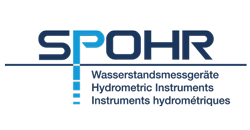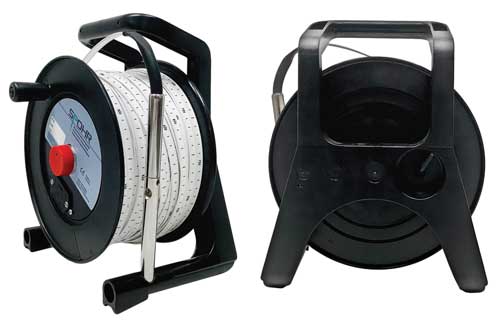- Durable reel made of lightweight plastic
- Compact and easy to transport
- Proven Spohr polyethylene flat tape with accurate markings
- Available with 15m, 30m, 50m, 80m or 100m tape lengths
The Spohr Lightweight Water Level Meter is designed for fast, easy, and reliable measurements of water levels in groundwater wells, boreholes, observation tubes, piezometers, standpipes, tanks, pipes, sewers, surface water, open water, and stilling wells. The Water Level Meter features a unique, lightweight reel that is made of robust plastic – an alternative to Spohr galvanized steel Water Level Meter reels.
The Water Level Meters use non-stretch, accurately marked polyethylene flat tape that Spohr is known for. Tape markings are permanently heat-stamped up to every millimeter. The 15mm diameter probe is corrosion-resistant and has a flexible tape seal. A narrow 12mm probe and other probe add-ons are also available.
How Does the Spohr Water Level Meter Detect Water Levels?
The Water Level Meters use a durable probe connected to permanently marked flat tape, mounted on a sturdy reel. A single standard 9V battery powers the Meters. When the zero-point of the probe contacts water a circuit is completed. This activates a bright LED indicator and audible buzzer on the reel. When the probe is raised slightly above the water level, the LED and buzzer are switched off so that the reading point can be determined. The depth to water is read off the high-precision tape.
Where Can the Spohr Water Level Meters Be Used?
- Monitoring domestic water well levels to help maintain supply, identify any issues, and obtain data that may be required for reporting purposes
- Measuring water levels during various points of well construction and development
- Monitoring water levels and drawdown during pumping tests
- Monitoring water levels during dewatering applications
- Obtaining groundwater data for drilling logs
- Measuring drawdown during groundwater purging and sampling
- Measuring levels/head to determine groundwater elevation and the direction of flow in hydrogeological investigations
- Getting insight on groundwater recharge and discharge
- Obtaining data during aquifer characterization tests, including slug, hydraulic conductivity, and step tests



 German
German English
English